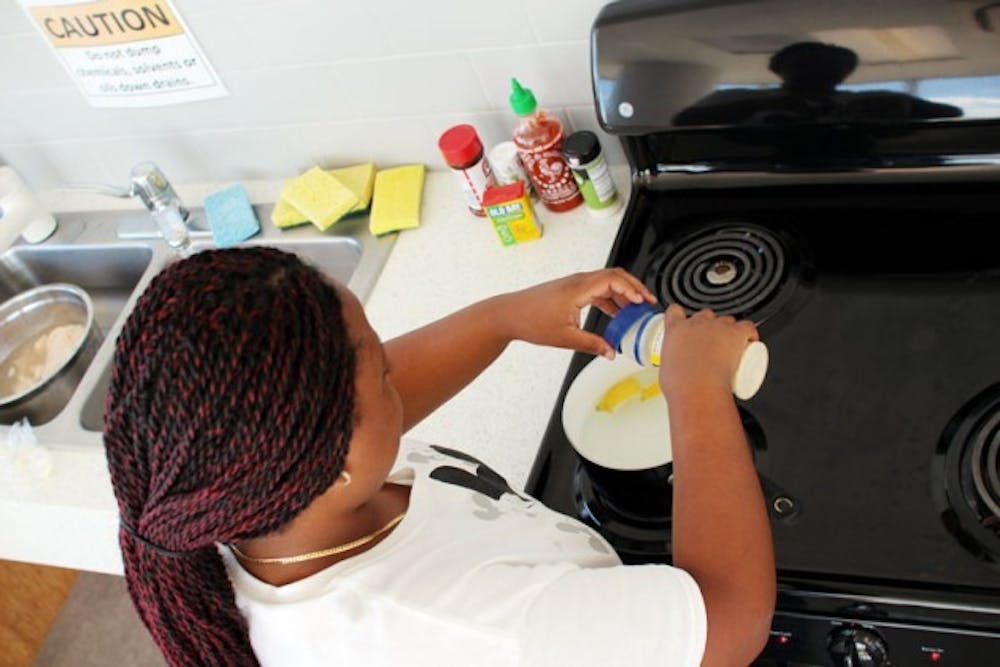In times of financial strife, some students are turning on their campus stovetops to save a few bucks.
UB mandates freshmen purchase a meal plan, and once that obligation is over, some upperclassmen who live on campus opt to cook rather depend solely on a meal plan. Meal plan options range from $550 to $5,190 per year, which can be steep for a college student on a budget.
Kelly Wu, a senior exercise science major, chose to cook in the dorms during her sophomore year because she found she couldn’t put her freshman-year meal plan to full use. She was wasting money.
During her freshman year, she purchased the 19-meal plan. But even after her switch to the 14-meal plan, she still found herself unable to use all her meals.
“Even though I had lowered it to the 14-plan, I was still left with two or three more meals to finish off, especially since I don’t usually eat breakfast,” she said.
“Any 19 Plans” cost $2,595 per semester and “Any 14 Plans” cost $2,450 per semester – freshmen have to choose one of these options. The plans give students 19 or 14 meal credits each week to use at on-campus dining centers or locations.
Instead of purchasing one of these meal plans in her sophomore year, Wu started buying her own groceries and making food in the dorm kitchens. She said she would spend around $60 during her weekly visits to Wegmans. Under the “Any 19 plan” students are spending about $172 per week on food, averaging the overall cost out over 15 weeks.
The biggest challenge for Wu was traveling to the kitchen. She struggled hauling food and utensils down the hall, going back and forth to the public cooking space.
Wu said another reason she opted out of the meal plan was because she missed the taste of home. She said a lot of food on campus is cooked is reminiscent of “fast food.”
“I just wanted more home-cooked meals,” Wu said.
She would usually cook Chinese meals or special dishes, like pasta, but still keeps Dining Dollars for a quick bite on campus.
Theresa Blaise finds the time to cook almost every day for every meal in Greiner Hall. The sophomore biology major works in the dorm’s kitchen space, which includes a stove and a microwave she shares with the people in her dorm room’s wing. The cooking spaces don’t have fridges, but students can have one small fridge for every two people in their dorm rooms.
Blaise has an “Upperclassmen Resident Plan,” which allows for 20 meals for the semester and $350 Dining Dollars for $550. Despite having a meal plan, she believes cooking with her roommate saves money and gives them alternative food options.
She splits the costs of groceries from Wegmans or Walmart and finds the stores that offer food discounts. She admits finding the time to prepare meals between classes can be tough, but it’s cheaper than having a full meal plan.
Some upperclassmen who live in the dorms, however, find the meal plans worth the money.
Juan Salazar, a junior exercise science major, loves to workout and said he needs a lot of food for muscle recovery and growth. A meal plan easily provides him with the food necessary for this. Salazar also feels he doesn’t have time to cook because there is a lot of work and studying involved for his classes.
Salazar currently uses the 19-meal plan. He said he tried the 14-meal plan before, but he switched back because it wasn’t enough. He is considering cooking next year when he moves to UB’s on-campus apartments, which have full kitchens.
But for students like Julia Stachowski, being able to prepare food is a priority and something she considered when transferring to UB from Nazareth College in Rochester. Stachowski, a junior communication and Spanish major, sets limits around $40 per week for groceries. She focuses her purchases on fresh fruits and vegetables.
She said the food at her old school would make her sick and cooking was a way for her to know exactly what she was eating. But she still uses her Dining Dollars for a quick meal, just as other UB students balance between saving money and convenience.
email: news@ubspectrum.com





